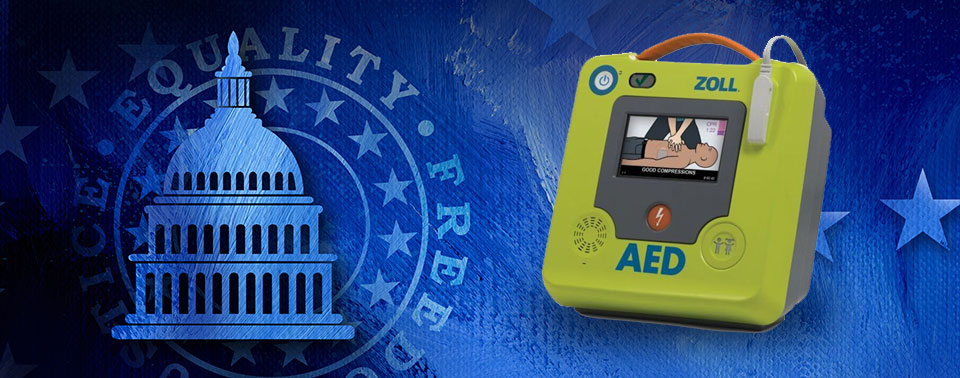← Back to Articles
ZOLL - State and Legislative Update - March 2025
Published: April 16, 2025

Recent Federal Legislative and Regulatory Developments
Some of the recent executive orders that paused funding for many federal programs has been met with temporary orders from federal courts requiring the funds to be disbursed. While some of those funding streams have been turned back on, not all of
them have resumed spending across the board, or at the same level as prior to the initial freeze order. Courts continue to evaluate the funding freeze, and have also ordered the government to resume paused programs, and in some cases have found
that it was not in compliance with court directives. Some of these programs could impact funding for federal grantees in the healthcare, education, and government sectors.
On February 21st, Congressman Scott Franklin (R-FL) and Congressman Gerry Connolly (D-VA) reintroduced H.R. 1466, the Cardiac Arrest Survival Act. The bill would encourage the use of AEDs during Sudden Cardiac Arrest (SCA) events by establishing nationwide
protections for individuals who deploy AEDs in out-of-hospital emergencies. Specifically, the bill outlines a national standard of civil liability protections for those who use, own, or manageAEDs during out-of- hospital cardiac emergencies, and
would ensure Good Samaritans can use AEDs without fear of legal repercussions. This would eliminate the patchwork of state liability protections that can vary by jurisdiction, and would provide a safe harbor for AED use. Originalcosponsors of
the Cardiac Arrest Survival Act include: Representatives Gus Bilirakis (R-FL); Darren Soto (D-FL); Kat Cammack (R-FL); Ken Calvert (R-CA); Jefferson Van Drew (R-NJ); Ben Cline (R-VA); and Donald Beyer (D-VA).
Recent State Legislative Developments
MINNESOTA:
2/25/25 - How to save a life: Revived bill would prepare schools for cardiac emergencies
SF 1457 - Summary: Mandates school districts and charter schools develop CERPs, beginning in the 2026-2027 school year. Plans must identify a cardiac emergency response team, ensure AEDs are clearly marked and easily accessible, and provide training
in CPR and AED use for coaches and staff. Schools must consult with athletic trainers, make the plan publicly available, distribute it to relevant personnel, and conduct annual drills and review. Requires the Minnesota State High School League
to adopt a similar plan for interscholastic athletic activities. The bill appropriates $2 million to help schools purchase AEDs, provide CPR training, and develop educational materials. The funding is a one-time appropriation available until June
30, 2027.
OKLAHOMA:
2/21/25 - Father and Oklahoma lawmaker push for AEDs in private gyms year after Mustang student's death
HB 2379 - Summary: Creates the "Doran Act of 2025," which requires each health spa to have at least one AED on the premises. AED must be accessibly placed. If the health spa is unstaffed, it must have a telephone for 911 access and a sign indicating
the location of and how to use the AED as well as CPR instruction. Provides civil liability protection for the health spa, unless no AED was purchased or there was gross negligence. If a health spa does not comply, any contract for health spa
services will be voidable at the option of the buyer. (In Oklahoma, a health spa is a business that offers physical exercise and related services, including a sauna, whirlpool, or weight-lifting room, or selling the right to use exercise equipment.)
PENNSYLVANIA:
2/20/25 - Student-athlete who survived cardiac arrest local lawmaker push to get AEDs at all athletic fields
HB 191- Summary: Repeals existing CPR and AED regulations, and replaces them with new requirements for schools. Mandates each school entity offer CPR and AED instruction to employees and volunteers at least once every two years, and at least one trained
individual be present in each school building during school days. Requires nurses, coaches, and athletic trainers to maintain certification for AED and CPR training. Establishes an AED Program to help schools acquire AEDs, requires schools have
at least one AED in each school building, and mandates that schools develop a CERP that includes evidence-based standards, annual reviews, and safety procedures for medical emergencies. Schools must provide documentation of training, and the instruction
can be conducted by recognized organizations like the American Red Cross or American Heart Association, with an option to provide training through internet or electronic means. Provides for three years for schools to implement the new requirements,
and allows for potential donations and funding to support the training and equipment acquisition.
Media Hits - A Collection of AED Use Stories
Florida - 'It's overwhelming': Sudden cardiac arrest survivor Ernie Withers visits Pirate City - 2/20/25
Pennsylvania - DuQuesne basketball medical staff saves dad of 3 who had heart attack during game - 2/20/25
HEARTS Act Overview 3.1.25